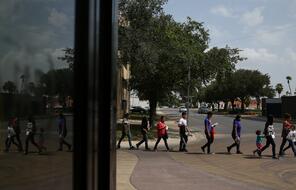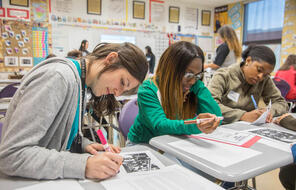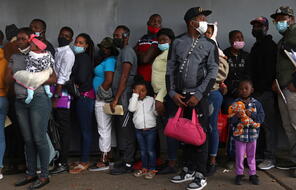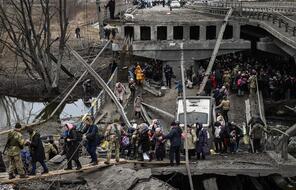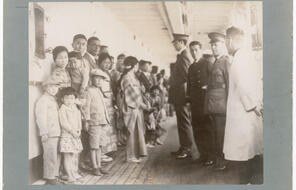"Home" by Warsan Shire
At a Glance
Language
English — USSubject
- Social Studies
- Global Migration & Immigration
Please note that this reading contains dehumanizing language. Dehumanizing language should not be spoken or read aloud during class.
We believe that the best way to prepare to encounter the language and topics in this poem is to create class contract outlining guidelines for a respectful, reflective classroom discussion. Teachers should plan how they approach the n-word when reading and discussing Shire’s poem. Finally, “Home” alludes to the sexual violence that some refugees face on their journeys. It is important that teachers preview the materials, know their students, and build in time and space for individual reflection in journals so that students can respond emotionally to what they are reading and learning.
Warsan Shire was born in Kenya to Somali parents and lives in London. She is a poet, writer, editor and teacher. In 2013-2014, she was the Young Poet Laureate for London.
Shire wrote “Conversations about home (at a deportation centre)” in 2009, a piece inspired by a visit she made to the abandoned Somali Embassy in Rome which some young refugees had turned into their home. In an interview, she told the reporter that “The night before she visited, a young Somali had jumped to his death off the roof.”
The encounter, she says, opened her eyes to the harsh reality of living as an undocumented refugee in Europe: “I wrote the poem for them, for my family and for anyone who has experienced or lived around grief and trauma in that way.” This poem became the basis for “Home,” printed below. “Home” has been shared widely across the media and has been read in a range of public spaces, including London’s Trafalgar Square. Commentators have noted that “Home” has touched a nerve among people, that it has offered a way to give voice to refugees and to provide some authentic understanding of the crisis.
"Home" by Warsan Shire
no one leaves home unless
home is the mouth of a shark
you only run for the border
when you see the whole city running as well
your neighbors running faster than you
breath bloody in their throats
the boy you went to school with
who kissed you dizzy behind the old tin factory
is holding a gun bigger than his body
you only leave home
when home won’t let you stay.
no one leaves home unless home chases you
fire under feet
hot blood in your belly
it’s not something you ever thought of doing
until the blade burnt threats into
your neck
and even then you carried the anthem under
your breath
only tearing up your passport in an airport toilet
sobbing as each mouthful of paper
made it clear that you wouldn’t be going back.
you have to understand,
that no one puts their children in a boat
unless the water is safer than the land
no one burns their palms
under trains
beneath carriages
no one spends days and nights in the stomach of a truck
feeding on newspaper unless the miles travelled
means something more than journey.
no one crawls under fences
no one wants to be beaten
pitied
no one chooses refugee camps
or strip searches where your
body is left aching
or prison,
because prison is safer
than a city of fire
and one prison guard
in the night
is better than a truckload
of men who look like your father
no one could take it
no one could stomach it
no one skin would be tough enough
the
go home blacks
refugees
dirty immigrants
asylum seekers
sucking our country dry
niggers with their hands out
they smell strange
savage
messed up their country and now they want
to mess ours up
how do the words
the dirty looks
roll off your backs
maybe because the blow is softer
than a limb torn off
or the words are more tender
than fourteen men between
your legs
or the insults are easier
to swallow
than rubble
than bone
than your child body
in pieces.
i want to go home,
but home is the mouth of a shark
home is the barrel of the gun
and no one would leave home
unless home chased you to the shore
unless home told you
to quicken your legs
leave your clothes behind
crawl through the desert
wade through the oceans
drown
save
be hunger
beg
forget pride
your survival is more important
no one leaves home until home is a sweaty voice in your ear
saying-
leave,
run away from me now
i dont know what i’ve become
but i know that anywhere
is safer than here
1
In an interview after she won the Brunel University African Poetry Prize, Warsan Shire was asked to talk about her sense of commitment to substance and urgent subject matter in her work. In response, Shire said:
I’m from Somalia where there has been a war going on for my entire life. I grew up with a lot of horror in the backdrop – a lot of terrible things that have happened to people who are really close to me, and to my country, and to my parents; so it’s in the home and it’s even in you, it’s on your skin and it’s in your memories and your childhood. And my relatives and my friends and my mother’s friends have experienced things that you can’t imagine, and they’ve put on this jacket of resiliency and a dark humour. But you don’t know what they’ve been victims of, or what they’ve done to other people. Them being able to tell me, and then me writing it, it’s cathartic, being able to share their stories, even if it is something really terrible, something really tragic. Sometimes I’m telling other people’s stories to remove stigma and taboo, so that they don’t have to feel ashamed; sometimes you use yourself as an example. 2
How to Cite This Reading
Facing History & Ourselves, “‘Home’ by Warsan Shire,” last updated January 5, 2017.
This reading contains text not authored by Facing History & Ourselves. See footnotes for source information.




